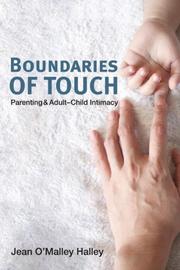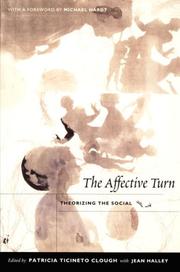| Listing 1 - 4 of 4 |
Sort by
|

ISBN: 1283044005 9786613044006 0252091450 9780252091452 9780252032127 0252032128 0252075811 9780252075810 9781283044004 6613044008 Year: 2007 Publisher: Urbana : University of Illinois Press,
Abstract | Keywords | Export | Availability | Bookmark
 Loading...
Loading...Choose an application
- Reference Manager
- EndNote
- RefWorks (Direct export to RefWorks)
Parent and child. --- Boundaries (Psychology) --- Touch --- Child and parent --- Children and parents --- Parent-child relations --- Parents and children --- Children and adults --- Interpersonal relations --- Parental alienation syndrome --- Sandwich generation --- Psychological boundaries --- Social psychology --- Psychological aspects. --- Boundaries --- Borders (Geography) --- Boundary lines --- Frontiers --- Geographical boundaries --- International boundaries --- Lines, Boundary --- Natural boundaries --- Perimeters (Boundaries) --- Political boundaries --- Borderlands --- Territory, National
Book
ISBN: 0230115187 1137071699 1349296511 Year: 2012 Publisher: New York Palgrave Macmillan US
Abstract | Keywords | Export | Availability | Bookmark
 Loading...
Loading...Choose an application
- Reference Manager
- EndNote
- RefWorks (Direct export to RefWorks)

ISBN: 9780822339250 0822339250 9780822339113 0822339110 0822389606 1283023075 9786613023070 Year: 2007 Publisher: Durham : Duke University Press,
Abstract | Keywords | Export | Availability | Bookmark
 Loading...
Loading...Choose an application
- Reference Manager
- EndNote
- RefWorks (Direct export to RefWorks)
“The innovative essays in this volume . . . demonstrat[e] the potential of the perspective of the affects in a wide range of fields and with a variety of methodological approaches. Some of the essays . . . use fieldwork to investigate the functions of affects―among organized sex workers, health care workers, and in the modeling industry. Others employ the discourses of microbiology, thermodynamics, information sciences, and cinema studies to rethink the body and the affects in terms of technology. Still others explore the affects of trauma in the context of immigration and war. And throughout all the essays run serious theoretical reflections on the powers of the affects and the political possibilities they pose for research and practice.”―Michael Hardt, from the forewordIn the mid-1990s, scholars turned their attention toward the ways that ongoing political, economic, and cultural transformations were changing the realm of the social, specifically that aspect of it described by the notion of affect: pre-individual bodily forces, linked to autonomic responses, which augment or diminish a body’s capacity to act or engage with others. This “affective turn” and the new configurations of bodies, technology, and matter that it reveals, is the subject of this collection of essays. Scholars based in sociology, cultural studies, science studies, and women’s studies illuminate the movement in thought from a psychoanalytically informed criticism of subject identity, representation, and trauma to an engagement with information and affect; from a privileging of the organic body to an exploration of nonorganic life; and from the presumption of equilibrium-seeking closed systems to an engagement with the complexity of open systems under far-from-equilibrium conditions. Taken together, these essays suggest that attending to the affective turn is necessary to theorizing the social.
Affect (Psychology).
---
Affect (Psychologie)
---
Affect (Psychology)
---
Cognition and culture
---
Emotions
---
Interpersonal relations
---
Traumatism
---
Cognition and culture.
---
Emotions.
---
Interpersonal relations.
---
Traumatism.
---
Accidents
---
Diseases
---
Shock
---
Surgery, Operative
---
Human relations
---
Interpersonal relationships
---
Personal relations
---
Relations, Interpersonal
---
Relationships, Interpersonal
---
Social behavior
---
Social psychology
---
Object relations (Psychoanalysis)
---
Feelings
---
Human emotions
---
Passions
---
Psychology
---
Affective neuroscience
---
Apathy
---
Pathognomy
---
Culture and cognition
---
Cognition
---
Culture
---
Ethnophilosophy
---
Ethnopsychology
---
Socialization
---
Causes and theories of causation
---
#SBIB:316.7C120
---
316:37 <0..>
---
#SBIB:39A4
---
Cultuursociologie: algemene en theoretische werken
---
Onderwijssociologie --
Book
ISBN: 0823299414 Year: 2022 Publisher: New York, New York : Fordham University Press,
Abstract | Keywords | Export | Availability | Bookmark
 Loading...
Loading...Choose an application
- Reference Manager
- EndNote
- RefWorks (Direct export to RefWorks)
"This highly accessible portrayal of a post-apartheid neighborhood in transition analyzes the relationship between identity, migration, and place. Since it was founded in 1894, amidst Johannesburg's transformation from a mining town into the largest city in southern Africa, Hillbrow has been a community of migrants. As the "city of gold" accumulated wealth on the backs of migrant laborers from southern Africa, Jewish Eastern Europeans who had fled pogroms joined other Europeans and white South Africans in this emerging suburb. After World War II, Hillbrow became a landscape of high-rises that lured western and southern Europeans seeking prosperity in South Africa's booming economy. By the 1980s, Hillbrow housed some of the most vibrant and visible queer spaces on the continent while also attracting thousands of Indian and Black South Africans who defied apartheid laws to live near the city center. Filling the void for a book about migration within the Global South, The Roads to Hillbrow explores how one South African neighborhood transformed from a white suburb under apartheid into a "grey zone" during the 1970s and 1980s to become a "port of entry" for people from at least twenty-five African countries. The Roads to Hillbrow explores the diverse experiences of domestic and transnational migrants who have made their way to this South African community following war, economic dislocation, and the social trauma of apartheid. Authors Ron Nerio and Jean Halley weave sociology, history, memoir, and queer studies with stories drawn from more than 100 interviews. Topics cover the search for employment, options for housing, support for unaccompanied minors, possibilities for queer expression, the creation of safe parks for children, and the challenges of living without documents. Current residents of Hillbrow also discuss how they cope with inequality, xenophobia, high levels of crime, and the harsh economic impacts of COVID-19. Many of the book's interviewees arrived in Hillbrow seeking not only to gain better futures for themselves but also to support family members in rural parts of South Africa or in their countries of origin. Some immerse themselves in justice work, while others develop LGBTQ+ support networks, join religious and community groups, or engage in artistic expression. By emphasizing the disparate voices of migrants and people who work with migrants, this book shows how the people of Hillbrow form connections and adapt to adversity"--
Immigrants. --- Manners and customs. --- Hillbrow (Johannesburg, South Africa) --- Social life and customs.
| Listing 1 - 4 of 4 |
Sort by
|

 Search
Search Feedback
Feedback About UniCat
About UniCat  Help
Help News
News